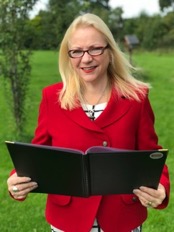

There has been a seismic shift in the way that funeral ceremonies are conducted in the wake of Covid-19. The effects of this on the bereaved are yet to be meaningfully understood. This conversation between a funeral celebrant and a mourner (at separate events) acknowledges the disruption caused. The impact of these changes, particularly the isolation of the bereaved and the voyeuristic nature of using social media platforms to livestream ceremonies, are also discussed.
Tracy Ward is a civil celebrant in Cumbria and also PhD candidate with the Glasgow End of Life Studies Group. Tracy has been coming to terms with the changes to her professional work during the pandemic. Dr Jane Rowley is a Research Associate on the Dying in the Margins project who recently attended the online funeral of a dear friend who took their own life during the first lockdown.
This recorded conversation is modelled on those recorded as part of BBC Radio 4’s The Listening Project. Jane talks about her intense focus on the celebrant as she delivered the eulogy and battling feelings of resentment that they could be there in person, while others had to watch at a distance. Tracy shares her feelings of discomfort at the ceremonies being watched by large numbers of unconnected people and how this impacts on the intimacy of developing a eulogy with a family. She describes the way she feels compelled to speak to the cameras and phones aimed at her during a ceremony and the incongruence of noticing hearts and thumbs up emojis as she works. Jane shares her discomfort about being told a personal story about her friend who had died, relayed by his mother during the eulogy, by someone who didn’t know him but who had watched the service after it was shared on social media.

Holloway et al. (2013) in their work on the ‘makings of a good funeral’ propose a three-stage process between families and funeral celebrants: meaning-seeking; meaning-creating; and meaning-taking. Each stage of this process offers opportunities to both celebrate the deceased and maintain a connection to them1. This work requires a sensitivity to the wishes of families and the time to ‘facilitate meaning’ through enabling choices, for example the music or readings. The Covid-19 pandemic has curtailed many of the choices available to people because of restrictions on the numbers of people who can attend, requirements for isolation in the case of a Covid-19 related death, and the limits on time to broadcast ceremonies online. The ceremony which Jane attended was cut short because of time limits on the broadcast and so people missed the opportunity to share a song that held meaning for her friend. In the podcast, Jane shares her disinclination to watch the recording of the ceremony again some weeks later. She says it would have felt slightly distasteful if not watching synchronously with other friends and family.
1. Holloway M, Adamson S, Argyrou V, et al. 2013. ‘Funerals aren’t nice but it couldn’t have been nicer’. The makings of a good funeral. Mortality Promoting the interdisciplinary study of death and dying, 18:1, 30-53, DOI: 10.1080/13576275.2012.755505.
If you have been affected by any of these issues, please seek help. There is always someone there for you.
Some helpful organisations:
BRAKE For death by road accidents
Pete’s Dragons for help with children affected by suicide
SANDS for those affected by the death of a baby – stillbirth or neo natal death
Winston’s Wish support for children impacted by murder or manslaughter
Support for the LGBT+ community is often regional. This link to NHS Scotland is helpful as a starting point http://www.sad.scot.nhs.uk/bereavement/supporting-lgbtplus-people-around-bereavement/

